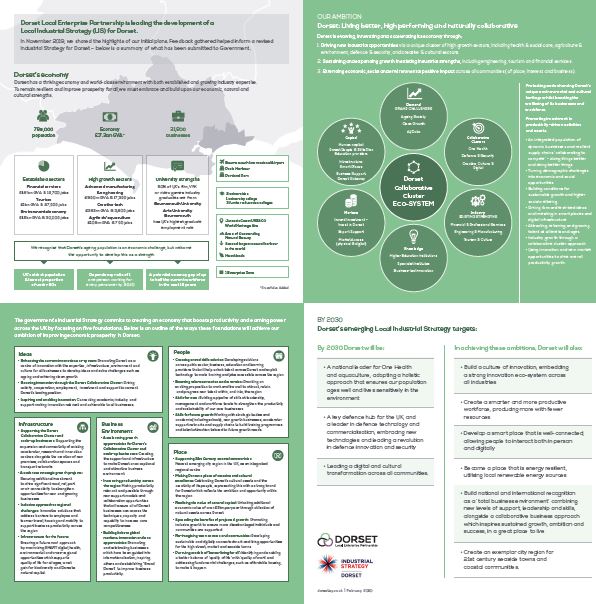Dorset is an exemplar of sustainable coastal living where new ways of living and working are tackling climate change head-on; where a way to age that’s fit for the 21st century forms a key economic and social opportunity.
 Dorset LEP, working in close collaboration with local businesses, organisations, BCP Council and Dorset Council, has led on Dorset’s Local Industrial Strategy (LIS). It is a twenty-year plan to increase productivity, innovation, earnings and wellbeing across the county, delivering on an ambition to create a local economy that is sustainable, innovative, resilient and inclusive.
Dorset LEP, working in close collaboration with local businesses, organisations, BCP Council and Dorset Council, has led on Dorset’s Local Industrial Strategy (LIS). It is a twenty-year plan to increase productivity, innovation, earnings and wellbeing across the county, delivering on an ambition to create a local economy that is sustainable, innovative, resilient and inclusive.
The draft strategy for Dorset was submitted to Government in December 2019. Below is an outline of the plans for Dorset and the evidence-base used.
A visual highlight summary and the full draft of our submission to government can now be downloaded.
Dorset's Local Industrial Strategy - 2019
Dorset has all the advantages of a highly self-contained location with a simplified governance landscape, and includes the newest emerging City Region in the UK alongside vibrant, largely rural surrounds. As a region, Dorset is evolving, innovating and accelerating its economy through:
- Driving new industrial opportunities via a unique cluster of high growth sectors, including health & social care, agriculture & environment, defence & security and creative & cultural sectors
- Sustaining and expanding growth in existing industrial strengths, including engineering, tourism and financial services
- Extending economic, social and environmental positive impact across all communities - of place, interest and business.
By creating an integrated population of dynamic businesses with resilient supply chains, Dorset is ‘collaborating to compete’ - doing things better and doing better things. Dorset wants to protect and enhance its unique environmental and cultural heritage whilst boosting the wellbeing of its businesses and workforce. By turning a demographic challenge into an economic and social opportunity, and building conditions for sustainable growth and higher social wellbeing, this Local Industrial Strategy (LIS) promotes investment in productivity-driven activities and assets.
Moving at pace over the next decade, this strategy will drive forward test-bed ideas and industry growth through a collaborative cluster approach. We will use innovation and new market opportunities from this activity to drive overall productivity growth alongside priority targets across the five foundations of productivity.
The vision
By 2030, Dorset will be:
- Using a One Health approach as a basis to age well and live sensitively in the environment. Dorset will be the UK lead for One Health and the aquaculture capital of the UK.
- Using opportunities of new technologies in security, lead a revolution in defence innovation and security. Dorset will be a key defence hub for the UK, and a leader in defence tech and commercialisation.
- Leading a digital and cultural transformation across all communities.
In achieving these ambitions, Dorset will also:
- Build a culture of innovation and embed a strong innovation eco-system across all industries
- Create a smarter and more productive workforce that produces more with fewer resources.
- Develop a genuinely smart place that is well-connected, allowing people to interact both in person and digitally; a place that is energy resilient, utilising local renewable energy sources
- Build national and international recognition as a ‘total business environment’ – combining new levels of support, leadership and skills alongside a collaborative business approach which inspires sustained growth, ambition and success in a great place to live
- Create an exemplar coastal city region for 21st Century seaside towns and coastal communities.
The background
In December 2018, the Government asked all LEPs to help deliver a national Industrial Strategy, which sets out long-term economic and investment priorities for the UK, by developing a Local Industrial Strategy (LIS). The overall aim is to boost productivity by helping businesses create good jobs and increase wages with investment in skills, industries and infrastructure, identifying both opportunities and 'grand challenges' for each region.
Structured around five foundations of productivity: ideas, people, infrastructure, business environment and places, the national industrial strategy identifies four grand challenges - artificial intelligence & data economy, clean growth, future of mobility, and ageing society - focusing on the global trends that will transform our future.
Review our extensive evidence base for the Dorset Local Industrial Strategy, further evidence for the LIS strategy can be viewed here.
COVID-19 Impacts and Recovery Research
We also undertook further COVID-19 Impacts and Recovery research to understand the impact of COVID-19 in Dorset and to reassure that the ambitions of the Dorset Local Industrial Strategy are still relevant and to help identify priority action for recovery.
Regional engagement
We have been proactive in seeking engagement with businesses, education providers, local authorities and the public in a range of ways over the past 18 months, including setting up a working group, hosting consultation events and an online survey.
1. Working group
A dedicated working group oversaw the development of the LIS. The group included Dorset LEP Board members and other key stakeholders from local businesses and organisations, who meet on a monthly basis.
2. Reports
We produced a series of economic reports and visionary documents telling the story of Dorset’s economic successes, specific challenges and ambitions, alongside steps needed to boost our productivity and increase our contribution to UK plc. Written in collaboration with the private and public sector, these reports collectively provide a solid foundation for developing our Local Industrial Strategy:
3. Consultation
Since the start of 2019, we have grown our evidence base through submissions from a range of local economic development stakeholders in the public, private and voluntary sectors. This has included data sets, research papers, surveys and strategies highlighting the importance of innovation, future growth of industries, technologies and skills.
In April 2019, we held public consultation events across the county enabling businesses and stakeholders to input and influence the development of Dorset’s LIS. As we develop our emerging thinking, we will continue to test this with businesses and other partners during 2019.
At our annual business conference on 24 May 2019, we launched an initial economic position paper detailing emerging priorities in the development of Dorset's LIS. 
In the autumn of 2019 we then shared a summary of our initial plans for a final consultation.